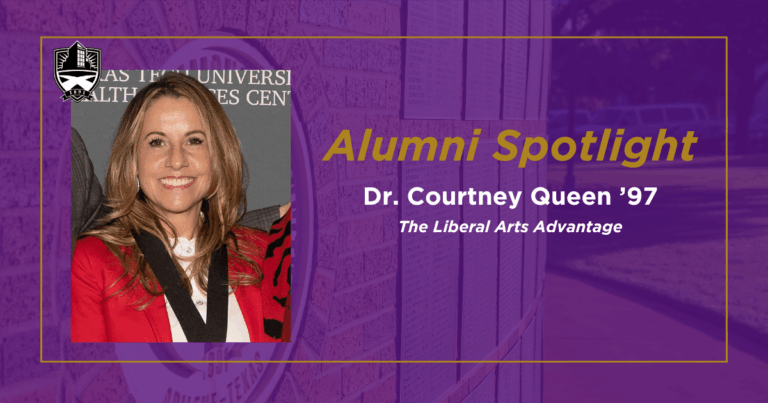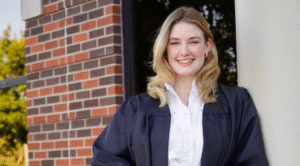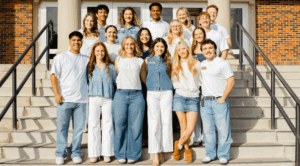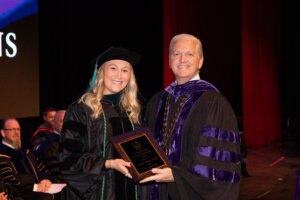Alumni Spotlight: The Liberal Arts Advantage

Texas Tech University Health Sciences Center recently named Dr. Courtney Queen ’97 as Interim Department Chair for the Department of Public Health and Associate Dean for Strategic Partnerships within the Julia Jones Matthews School of Population and Public Health. Her work now centers on building the academic and community framework for a growing school designed to advance health equity and innovation across West Texas. The foundation for that work started not in a lab, but in a liberal arts classroom at Hardin-Simmons University — a path she chose for an unexpected reason.
“To tell you the truth, choosing Hardin-Simmons actually wasn’t my choice. It was my parents,” Queen said with a laugh. “They told me to pick one of three schools in Abilene, and I said, ‘Well, that one has the prettiest campus.’ It wasn’t strategic. It wasn’t particularly thoughtful.”
It was, however, transformative.
Today, from her office in Abilene, Queen works at the intersection of innovation and community health. She’s a Fulbright Scholar, a National Institutes of Health National Institute on Minority Health and Health Disparities scholar, and a Health Equity Leadership Institute scholar. Her research focuses on developing noninvasive, low-cost devices for early disease detection in underserved communities. She builds partnerships between universities, communities, and corporations and creates pathways for students pursuing careers in public health.
None of that seemed possible when she walked into her first freshman class. But that’s the point.
When she arrived at Hardin-Simmons, she didn’t have a clear plan. That changed due to the people who poured into her. She recalls Dr. Stafford’s field trip to the Walls Unit and death row, Dr. Bridges’ probing sociology discussions, and Dr. Copeland’s social psychology course, moments that, together, shaped her more deeply than any other season of her academic life.
One influence in particular came from a European history class with Professor Paul Madden. She still remembers how he would lean against the desk, speaking with passion, intensity, and an almost effortless charisma. His presence filled the room — not with authority, but with connection.
“He taught us that nothing happens because of just one thing,” she said. “He had this list of seven things that led to World War II. That framework — understanding that complex problems have complex causes — mapped out my life and how I approach problem solving as part of my career.”
That lesson shaped how she approaches the world. College, she says, was where she learned not only her subject, but also herself.
“Everybody goes to college thinking they know what they want. They really have no idea. College is about changing your mind a million times,” she said. “That’s part of learning and growing and being a young adult.”
She loved history but wasn’t sure where it would lead. A visit to the HSU Career Center connected her with Loraine Hendrix ’00, who called her friend Morris Baker at the Peace Corps. Queen had always dreamed of serving, but when she told her family about the opportunity, the reaction was disappointing.
“Nobody was happy for me,” she said. “I cried, and I decided to go to graduate school.”
She enrolled at the University of North Texas to study public administration. It seemed practical, but it didn’t fit.
“I loved the practical skills, but I kept asking why. I kept going back to my history degree,” she said. “So, I switched to sociology, which was the perfect complement. It really helps tell us how and why and proposes theories and options and then gives us the statistics and the skills to help us answer those questions.”
While finishing her master’s degree, Queen worked for the city of Southlake as community services coordinator, learning how to mobilize stakeholders toward shared goals.
“It was probably one of the best jobs I’ve ever had,” she said. “I worked with volunteers to make programs happen. I ran boards and presented changes to ordinances that incited real change.”
One project in particular showed systems thinking in action: protecting green space during the city’s rapid growth.
“That group really brought the policy and advocacy to say, we do want development, but we’re not willing to give up our green space,” she said. “So how do we write strong policy and advocate for strong policy to keep it?”
The result was a policy requiring developers to plant two trees for every one removed.
“If you go to Southlake Walmart, it is the most beautiful parking lot you’ve ever seen,” she said with a laugh. “We had our values, we knew our community. We were able to advocate and have a policy toward health and wellness and culture.”
It was work that required understanding history, mobilizing people, analyzing policy, and recognizing how individual decisions shape entire communities. Those skills, she says, were rooted in her liberal arts education.
As her master’s program concluded, the Peace Corps dream resurfaced.
“This time, I didn’t tell anyone until four months before I left,” she said. “I told them this is what I want.”
She was older and more certain.
“I was two years more mature. I knew more about what I wanted,” she said.
Queen served in Latvia, where her history background helped her understand the culture of a country still defining itself after the fall of the Soviet Union.
“That was a great time in history to be there,” she said. “Part of the reason why I wanted to be in that part of the world is because I had a great history degree from Hardin-Simmons that had prepared me to live there and understand it — or seek to understand.”
After the Peace Corps, Queen returned to the University of North Texas to pursue a doctorate in sociology. She kept one foot in the classroom and the other in the field, working in both the private sector and nonprofit advocacy. She consulted with Exxon Mobil on migration projects, helping Russian oil field workers relocate to the United States and Canada.
“At the time I spoke Russian, so I would go to these sites and work with them on cultural adjustment,” she said. “That meant helping them learn how to communicate with someone from a different culture and language. It also meant finding ways to express big safety concerns when you’re wearing gear that limits all of your senses.”
She also worked in anti-death penalty advocacy, conducting mitigation research for capital cases in Harris County.
“You interview three degrees away from that person,” she explained. “So, you talk to their first-grade teacher, and if the teacher mentions who they were buddies with, you talk to them, too.”
The work required her to build cases for life using research and analysis.
“I understand the role of history, and I understand the role of biography in somebody’s life,” she said. “Then we have the research methods and the analysis techniques to help understand the role of all of these events in history that would cause or have this really poor outcome of a human being or a community or nations or a continent.”
Her liberal arts background remained at the core.
“Even with that, my time as a history major at Hardin-Simmons determined how we would approach it,” she said. “How we understood how all of the events going on in this young person’s life would lead to this outcome.”
Her career kept building from there. At the University of Houston, she worked with engineers to secure the college’s first NIH grant, developing algorithms for early detection of neglected tropical diseases. She spent months each year in West Africa collecting data and applying her skills to real-world problems.
“My liberal arts training made me valuable in a STEM environment,” she said. “I brought a way of thinking they needed.”
Today, as associate dean for strategic partnerships at Texas Tech’s Julia Jones Matthews School of Population and Public Health, Queen continues to draw on everything she learned at Hardin-Simmons and beyond. She builds academic, community, and corporate partnerships, creates pathways for students, and advances innovative health solutions for rural communities.
“Everybody goes to college, and they think they know what they want, and they really have no idea,” she said. “Everybody thinks they want to be a doctor or a lawyer, but that’s because they don’t know that there are thousands of paths you can take.”
She encourages students to explore those paths with openness.
“Yes, change your mind a million times. That’s what you’re supposed to do,” she said. “That’s part of learning and growing and being a young adult. That’s part of education — going and learning more and then pivoting. And then learning more and then pivoting again. You’re never going to be the same person when you walk out the door as when you walk in. And that’s the whole point. You’re not just learning historical facts. You’re learning perspective, how to think, how to analyze. There are so many soft skills in those types of degrees that other degrees try to teach explicitly. We learned it organically.”
She often tells students that a career path doesn’t need to follow a straight line.
“It doesn’t have to be one step after another,” she said. “I’ve lived a lot of different lives, and they all go together. Every part needs the other.”
Now, Queen is creating those same opportunities for the next generation. She’s connecting students to careers, developing technologies that serve communities, and applying historical thinking to public health challenges.
For students wondering whether a liberal arts degree can lead to meaningful impact, her career offers a clear answer. Sometimes, choosing a school for its pretty campus turns out to be the best decision you never knew you were making. And sometimes, learning to think in seven things prepares you to change the world in ways you never expected.
“I still consider myself a cool person because I got a degree in history,” Queen said with a smile.
The evidence suggests she’s right.


